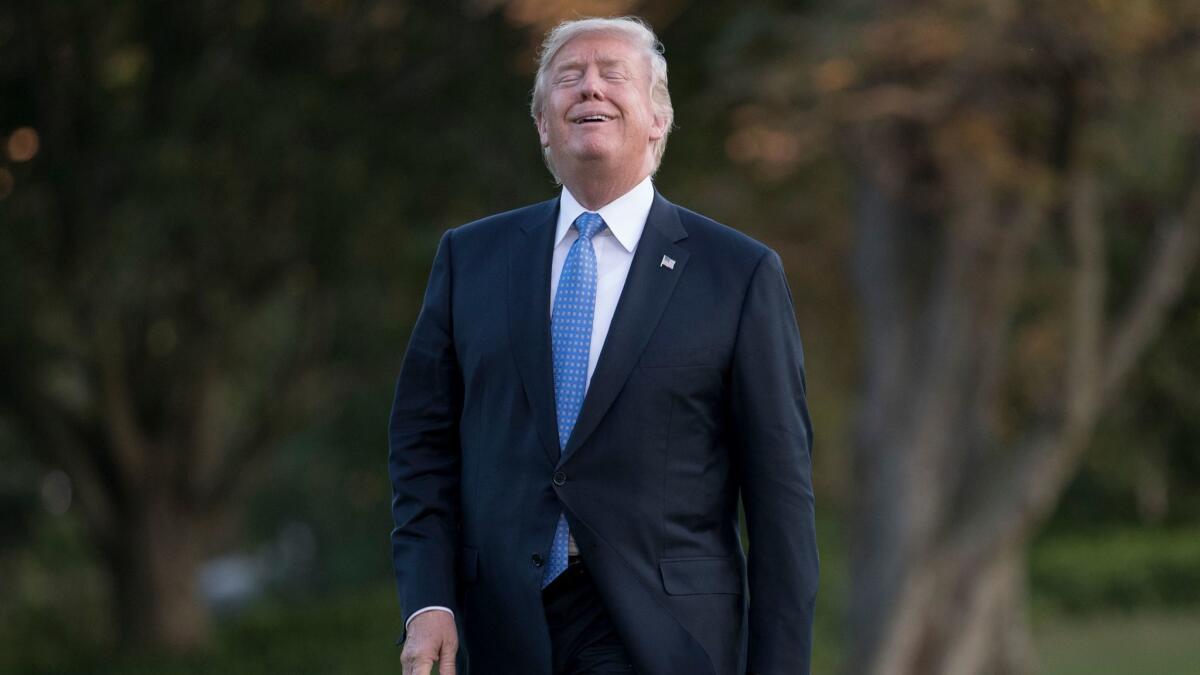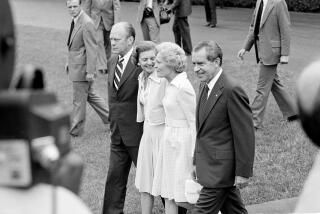Op-Ed: Trump’s narcissism has taken over America

In the Greek mythological version of this presidency, our self-obsessed leader would already be dead of starvation, having been transfixed and immobilized by his reflection. But America has not let Donald Trump spiral into narcissistic irrelevance. The opposite has happened: We’ve all become as obsessed with Trump as he is with himself. It’s the country that’s transfixed and immobilized.
Of course party operatives have always worried about how the president is perceived by the public. But there was once a time when the rest of us evaluated executive decisions based on what effect they would have on the world, not just on the approval rating of the person occupying the White House.
We now filter much of our experience through whether Trump’s actions are “good or bad” for Trump. The NFL protests—good or bad for Trump? Nuclear threats against North Korea — good or bad for Trump? The latest attempt to repeal the Affordable Care Act —good or bad for Trump? The solar eclipse—good or bad for Trump? (Astrologers, for what it’s worth, said “bad.”)
Sure, we might also read about the political aims of the kneeling NFL players, watch a video about terrified South Koreans prepping for disaster, or let our minds wander to the people who rely on health insurance exchanges. We understand, on some level, that there are lives at stake.
Who cares what’s good or bad for Trump? What matters is whether his decisions are good or bad for the rest of us.
Yet our bad habit is as steady as Narcissus’ reflection in the water: Each news story and its subsequent social-media commentary comes back to its potential effect on Trump.
This is true even when the people involved say their actions are not about Trump. NFL player Colin Kaepernick first decided to sit during the national anthem last year, before the election. “I am not going to stand up to show pride in a flag for a country that oppresses black people and people of color,” he said at the time. Most of the pro football players who chose to take a knee in recent weeks have made it clear that they, too, kneel in opposition to the killing of black Americans by police and as a call for racial justice.
Their protest is about so much more than Trump. Yet some could only interpret it as an attempt to annoy the president. “Trump wants you to kneel — because it divides the nation, with him and the flag on the same side. Don’t give him the attention he wants,” tweeted Republican Sen. Ben Sasse of Nebraska, managing the impressive feat of both ignoring the players’ stated goals and directing even more attention to Trump in fewer than 140 characters.
Trump was also the center of attention in Alabama, where he appeared at a rally on behalf of Sen. Luther Strange, the struggling incumbent Republican candidate in a special-election runoff. (Strange lost his bid on Tuesday.) Trump set the tone that the race was really all about him: “I’m taking a big risk because if Luther does not make it, they are going to go after me,” he told the crowd, in a speech that was mostly a drawn-out defense of his own behavior since January.
And at a separate rally on behalf of Roy Moore, who challenged Strange for the seat, Trump’s former chief strategist Steve Bannon agreed that this Alabama special election was, in fact, a referendum on the president. “We did not come here to defy Donald Trump, we came here to praise and honor him,” he said.
Bannon knows as well as anyone that the president views every single event as either a threat to defy him or an opportunity to earn him praise and honor.
So do we.
We’re all taking our cues from the president. The Washington Post reported, “After being praised for his response to hurricanes Harvey and Irma, which struck Texas and Florida the hardest, Trump has received lower marks for his response to Maria.” When Republicans’ latest attempt to repeal the Affordable Care Act failed, commentator Bill Maher noted that “This looks bad for Trump.”
It’s as if we’ve collectively failed to accept that Trump has been sworn into office, and that his actions now have direct consequences for Americans and indeed the planet. The real-time scorekeeping feels like a holdover from the debates and polls and primaries of the 2016 campaign, when everything was still in the realm of the hypothetical. The president is in perpetual campaign mode, continuing to send fundraising emails and hold rallies as if the election never happened.
That doesn’t mean the rest of us should join him. Who cares what’s good or bad for Trump? What matters is whether his decisions are good or bad for the rest of us.
Ann Friedman is a contributing writer to Opinion. She lives in Los Angeles.
Follow the Opinion section on Twitter @latimesopinion or Facebook
More to Read
A cure for the common opinion
Get thought-provoking perspectives with our weekly newsletter.
You may occasionally receive promotional content from the Los Angeles Times.





